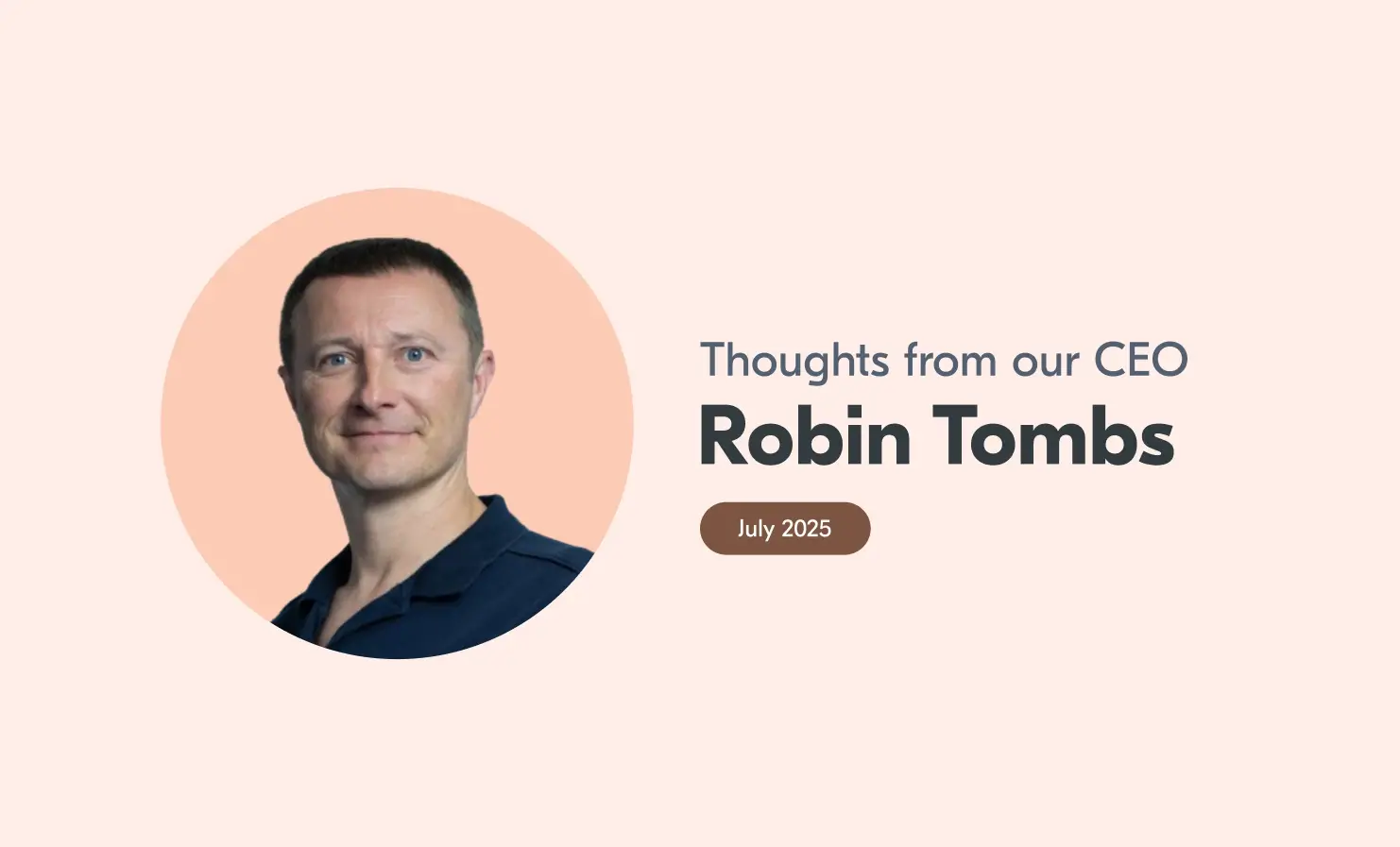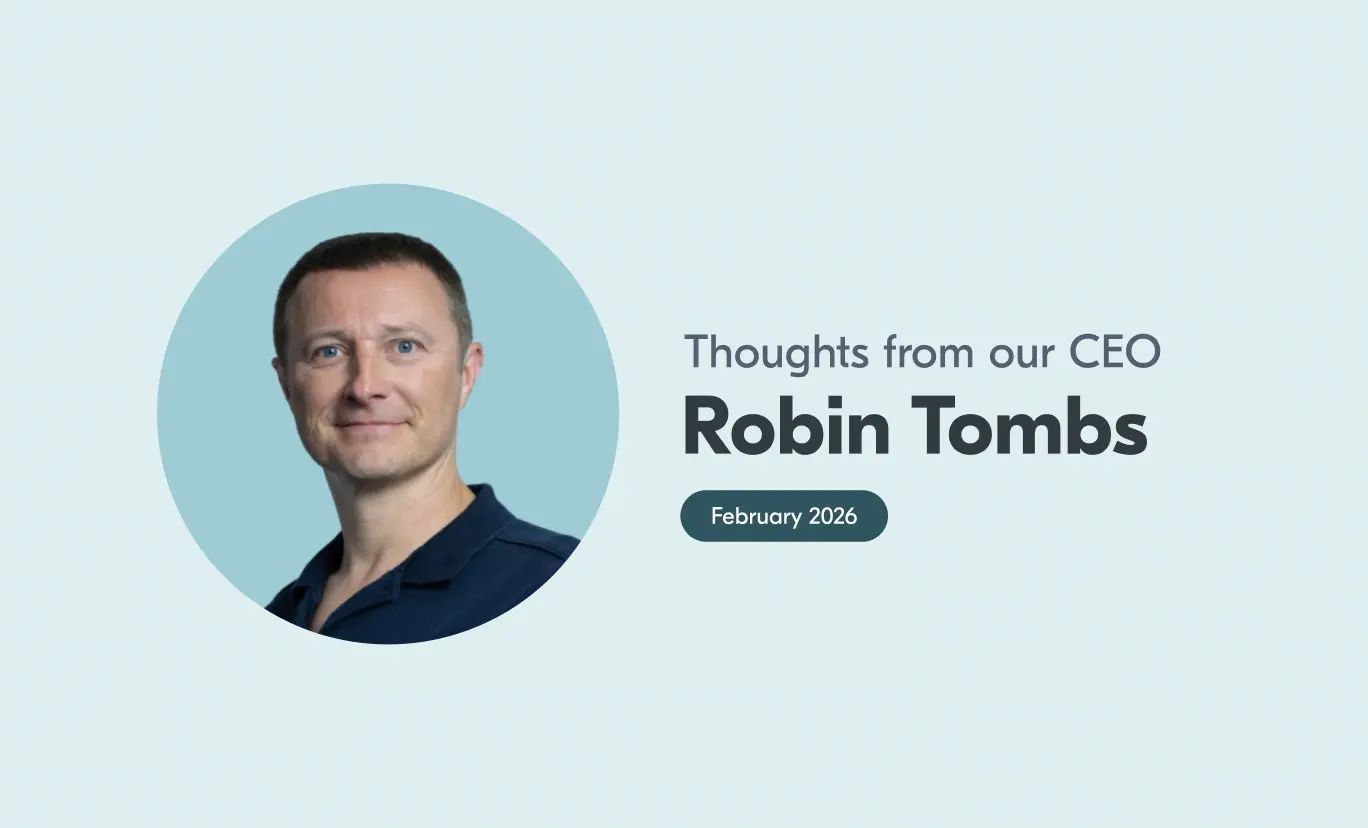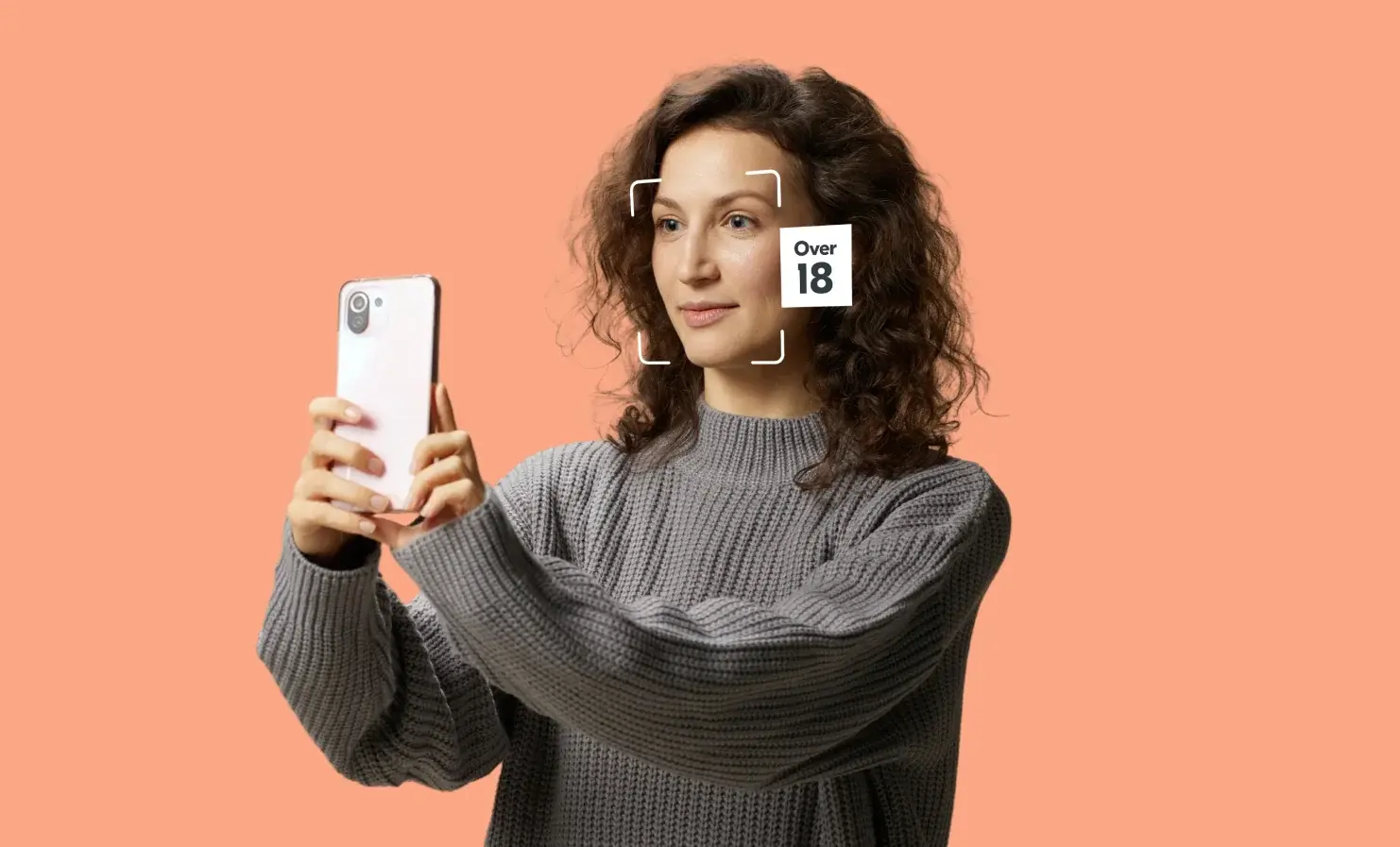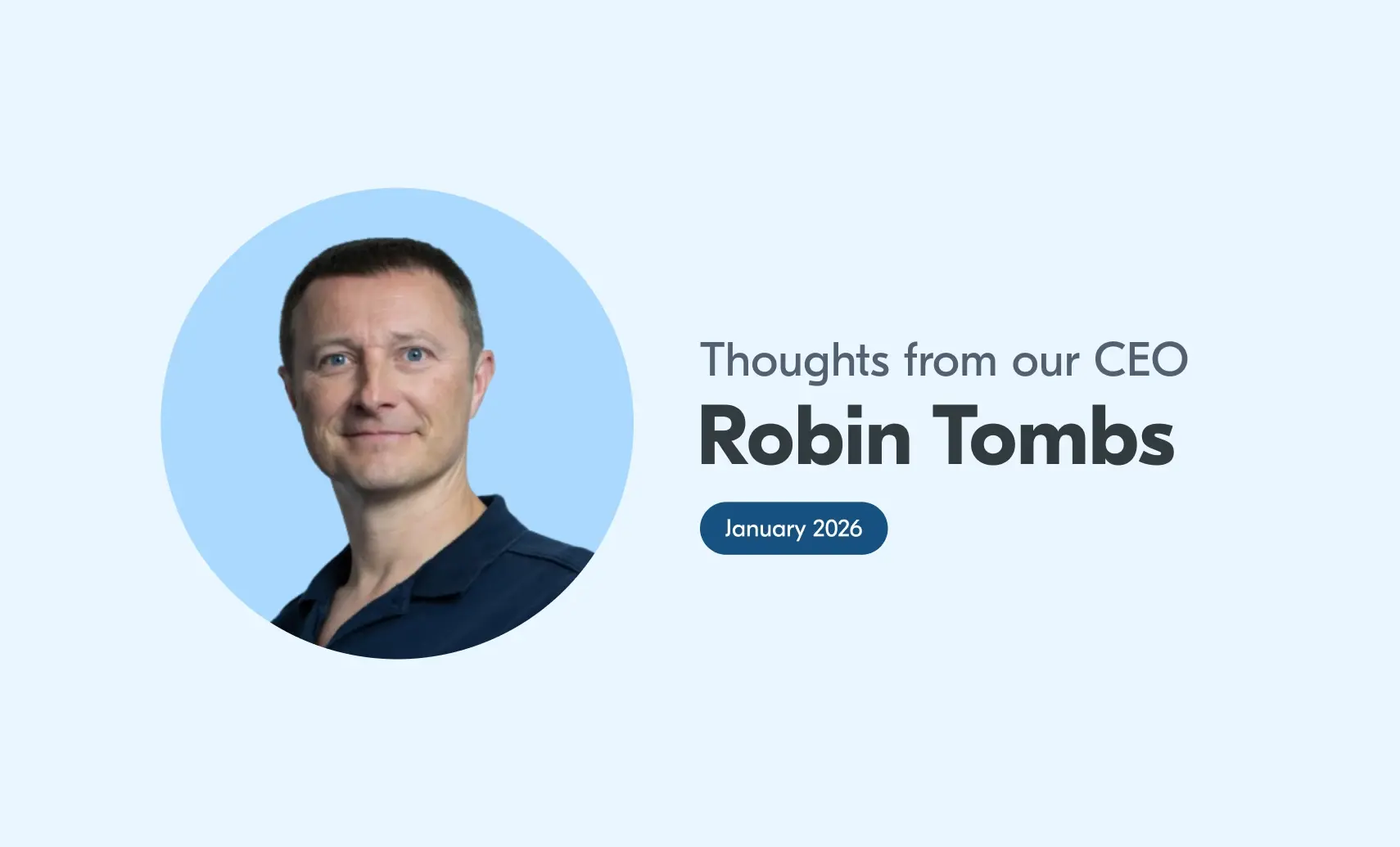
In this blog series, our CEO Robin Tombs will be sharing his experience, whilst focusing on major themes, news and issues in the world of identity verification and age assurance.
This month, Robin focuses on the Online Safety Act, talking about facial age estimation accuracy rates, the increase in Digital ID usage and reaction to the new legislation coming into effect.
Online Safety Act sparks Digital ID boom
The UK’s Online Safety Act came into effect on Friday 25th July, delivering some bumper results for Yoti. We launched our “Porno Pete” video across TikTok, YouTube, Instagram and Facebook on Monday 21st July. Over 1.5 million UK individuals watched it in the three days that followed.
After seeing UK Yoti app downloads go past 6 million on 15th July, we shared a link to Pete’s video in the app on Friday 25th July – the same day that the Online Safety Act kicked in. By Sunday, UK views had jumped well past 4 million.
For the third day in a row, the Yoti Digital ID wallet ranked as the second most downloaded app in the UK Apple App Store. This confirms that lots of UK adults want to prove their age once in the free Yoti app, so they can then easily reshare their ‘over 18’ credential with porn sites and other businesses that need to check age.
There are so many benefits for Britain to unlock once ten(s) of millions of Brits have voluntarily chosen to use a certified reusable digital ID, and once hundred(s) of thousands of British businesses have chosen to accept certified reusable digital IDs for proof of age, identity, credentials and ID-verified payments.
With the Government planning to update the alcohol licensing laws by year-end – allowing for certified digital ID wallets for digital proof of age across roughly 200,000 licensed premises – digital ID adoption is fast approaching a network tipping point.
Accuracy for teens up in Yoti’s new facial age estimation model
The results are out for Yoti’s latest June 2025 facial age estimation model. Our global customers are most keen to see us further improve our accuracy for 13-19 year olds. Our mean absolute error for this age group has fallen. A lower mean absolute error means that the model is more accurate. It has improved by 7.8%, going from 1.34 years in the September 2024 model to 1.23 years in the new June 2025 model. Accuracy has also improved across gender (male and female) and skin tone (on a scale of 1-3, from lightest to darkest).
Our mean absolute error is now 0.98 years for 15 year olds, 0.89 years for 16 year olds and 0.88 years for 17 year olds. These are now all under 1.0 year, which will further reduce our false positive rates and false negative rates when businesses use a ‘challenge’ age of 18 to assess if a person is aged over/under 16 years old or a ‘challenge’ age of 20 to assess if a person is aged over/under 18 years old.
These improvements make facial age estimation even more inclusive. An even higher percentage of over-16s can now use facial age estimation to confidently prove they are over 18. Fewer 16-19 year olds will need to use identity document-based evidence to prove they’re over 16.
Using a 2 year buffer (using a challenge age of 20 for being over/under 18, or a challenge age of 18 for being over/under 16):
- In the UK, over 95% of adults could use Yoti’s facial age estimation to give strong confidence they are adults (18+), whilst denying access to almost all under-18s.
- In Australia, over 95% of those aged 16 or over could use Yoti’s facial age estimation to give strong confidence they are over 16 on social media, whilst denying access to almost all under-15s.
We’re submitting this new model to the National Institute of Standards and Technology (NIST) for independent evaluation and results publication. NIST have already published that Yoti’s September 2024 facial age estimation model is the most accurate model they’ve evaluated for teenagers (aged between 13 and 16). Our new June 2025 model will further improve our NIST-measured accuracy.
This month, we published our new facial age estimation white paper. It sets out accuracy by year of age (6-70), gender and skin tone. We have transparently published this data since January 2019.
From 21st July, the Irish regulator Coimisiún na Meán requires either effective age estimation or age verification for online porn. And from 24th July, the UK regulator Ofcom requires similar rules.
Many of our customers, and an increasing number of regulators, want to see further improvements so that children can only gain access to age-appropriate content.
It’s very hard and expensive to legitimately capture facial images with ground truth age for children aged between 6 and 15 in order to improve the accuracy of facial age estimation for children. But Yoti remains super committed to improving the effectiveness of privacy-preserving age checks, including facial age estimation.
Yoti powers seamless age checks
Ever since the start of the consumer internet in the mid-1990s, online porn businesses have been at the forefront of tech innovation. Almost all the big brands and smaller operators are privately owned, so they’re very quick to make commercial decisions.
Over 100 porn brands use Yoti age verification services to comply with age check regulations in many US states, France and the UK.
Almost all these porn sites enable individuals to share an ‘over 18’ credential using their privacy-preserving Yoti Digital ID wallet, which is a free service for all businesses globally. Just over 1 in 6 individuals (across porn and other sectors using Yoti’s age verification services) already easily prove their age anonymously using their Yoti app. This percentage is rising.
Young adults in particular use Yoti because some will fail facial age estimation that has a challenge age of 20 or 21. However, plenty of older adults use Yoti because they do not want to have to do facial age estimations on lots of different porn and non-porn sites. They can do a single facial age estimation in the Yoti app, and then easily and quickly reshare their ‘over 18’ credential hundreds of times without doing another new age check.
In the UK, reusable Yoti age tokens and their reusable passkey cousin, Yoti Keys, will both become very popular over the next 6 months.
This means the majority of individuals won’t need to repeatedly use identity documents, credit cards, or a combination of their name, date of birth and address to prove their age at thousands of websites and apps where age checks are increasingly required.
58% of UK Yoti ID users who have added a passport, driving licence or PASS card to their Yoti ID wallet, are aged between 18 and 29. Over 6 million UK individuals have downloaded the Yoti app.
This 58% figure was even higher a few years ago. But over the last 2 years, more people aged between 30 and 60 are creating a Yoti Digital ID to prove their identity for online right to work, right to rent and criminal record checks, while fewer 18-29 year olds remain without a Yoti Digital ID.
Britain goes big on digital ID
For our 6 million UK users, owning a Digital ID on their phone is a no-brainer. But for them, patience has been a forced virtue. Many have had their Yoti ID for 3-5 years, some who signed up as teenagers 7 or 8 years ago are now 25 years old!
The hardcore security of the Yoti Digital ID wallet hasn’t changed materially since its beta launch in November 2016. We knew it would take a while for the UK Government to update laws and regulations to empower digital ID wallet users – but it’s been an extremely long wait.
An orderly single file queue of Yoti’s 6 million users starting on the beach at Brighton would stretch to John O’Groats on the north Scottish coast, come back to Brighton and then go back up to Durham – 1,850 miles! The mother of all British queues, but hopefully Yoti users’ patience will (relatively) soon be rewarded 🙏🏻
In April 2022, the Government changed the regulations to allow certified digital ID owners to use their digital ID to prove their identity for right to work, right to rent and criminal record checks – a very popular utility.
In December 2024, Peter Kyle finally announced that the Government would change the alcohol purchase laws before Christmas 2025. This will allow licensed premises to accept certified digital proof of age for younger adults wanting to buy a beer in the pub or all adults at a supermarket self checkout.
The UK has also now passed the Data (Use and Access) Act. This gives digital proof of identity and age a firm legal footing. OfDIA says the alcohol laws are still on track to be updated before Christmas, which will then massively drive up the adoption of certified digital IDs. There should be 7 million Yoti ID users by Christmas 2025 and over 10 million by Christmas 2026.
For many UK individuals and businesses, one of the really big benefits of certified digital IDs will come when the Treasury, Financial Conduct Authority and Joint Money Laundering Steering Group update their regulatory guidance to reassure compliance officers that they can rely on certified digital IDs as part of Know Your Customer (KYC) checks.
The recently-published Treasury response to the consultation on Improving the Effectiveness of Money Laundering Regulations looks promising. The Treasury has committed to working closely with the Department for Science, Innovation and Technology and OfDIA to ensure millions of UK citizens, alongside tens of thousands of finance sector businesses, can benefit from the use of certified digital IDs.
It could be that in just a year or two’s time, millions of UK citizens are using a certified Yoti Digital ID to not only prove their age to buy beer and wine, but also to prove their identity to open an account in the financial sector, or complete Know Your Customer checks in the insurance sector.
The rise in VPN use amid the push for age checks
Few people envy being a politician in the UK. On BBC News, DSIT Secretary of State Peter Kyle had to defend the Government’s decision to introduce age checks under the Online Safety Act, against a backdrop of a predictable spike in VPN downloads to bypass age checks.
When asked, the vast majority of adults (not just parents), as well as a healthy percentage of teenagers say that they think age checks should be in place to reduce children’s access to online porn and some other harmful content.
The UK public is digitally quite savvy, I think. They know age checks won’t be 98% or 100% perfect. They also know that some adults and teenagers will choose to use VPNs to bypass age checks by masking their UK location.
But they also don’t want young children in the UK to easily stumble across hardcore porn or content relating to self harm, suicide or eating disorders via an age tick box.
If the top 10 VPN businesses have collectively added around 3 million (mostly free) users, is that actually a big number – given that the UK population of over-13s is 60 million, and that a lot of porn viewers want to keep their porn surfing private?
If, for instance, 15-20 million Brits aged over-13 already use VPNs, an extra 2 million, 3 million or even 4 million VPN users isn’t that big an increase.
Yoti does age checks in the UK market for a lot of the biggest brands across social media, vaping, live streaming, dating, gaming and many medium and smaller-sized porn sites.
In recent months we have been handling around 1 million age checks a day. Globally, our core systems handle reusable Digital ID activity, one-off identity document checks, age checks, standalone liveness checks, face matching checks and document eSigning.
In recent weeks, our core systems have been handling an average of 10-40 requests per second across our network each day. That’s a lot of activity.
When the Online Safety Act came in, on Friday, Saturday and Sunday, our core systems handled an average 40-160 requests per second. Almost all of that huge increase has been UK activity, mostly due to massive jumps in UK age volumes.
As the Minister explained, over the last few days the free Yoti Digital ID app has been one of the most heavily downloaded apps in the UK.




